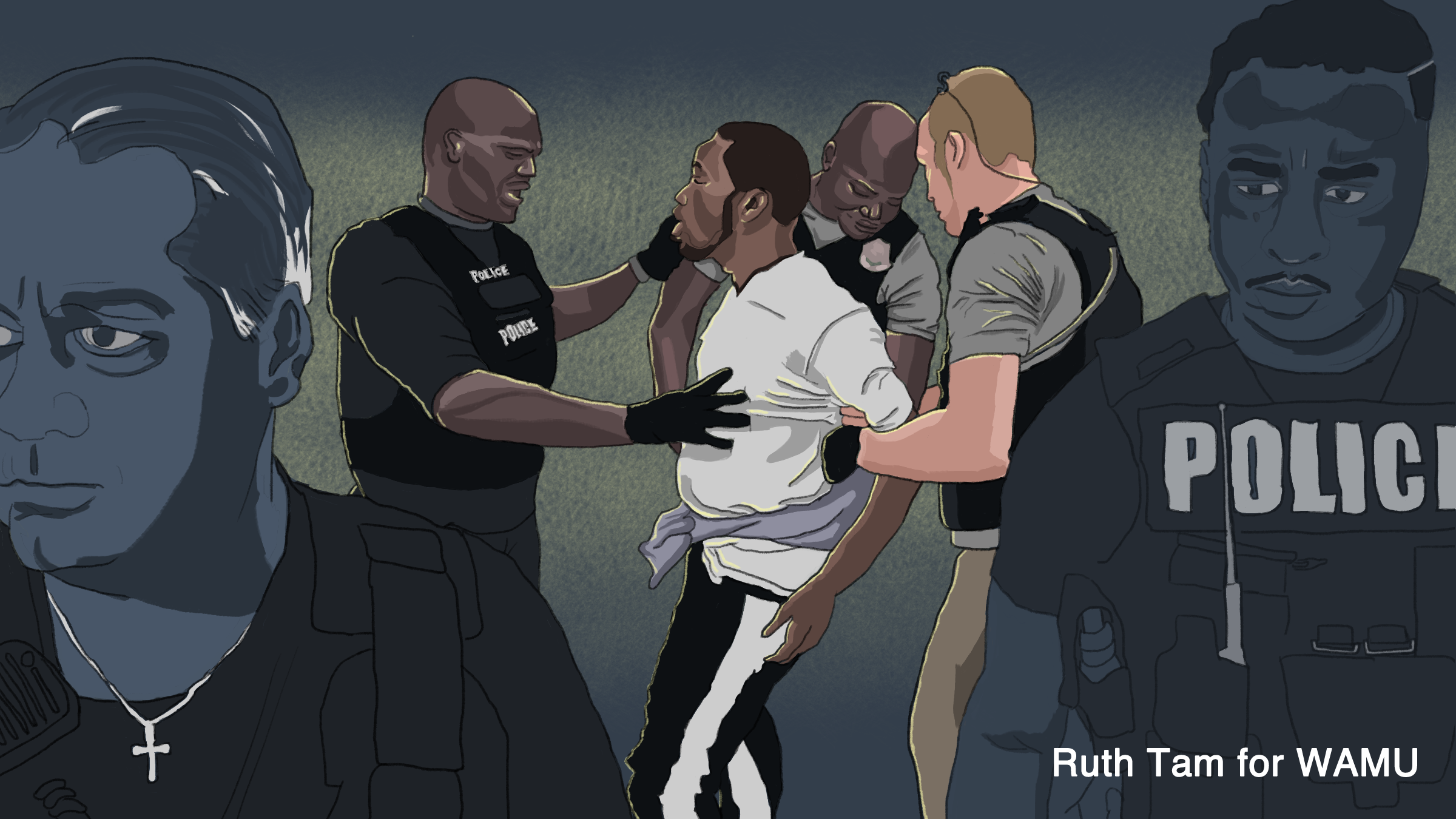Few police departments are better at finding illegal guns than D.C.’s Metropolitan Police Department. But in the day-to-day battle to get guns off the street, residents in some majority-African American neighborhoods say they are being caught in the crossfire between an ongoing epidemic of gun violence and aggressive police tactics.
To combat violence, MPD officers focus on recovering firearms. In 2016, D.C. police confiscated more than five times as many illegal guns per capita as did the New York City Police Department, and nearly twice that of the Los Angeles Police, according to police data. Many suspects charged with gun possession, however, ultimately walk free, according to an analysis of court documents by WAMU and the Investigative Reporting Workshop at American University.
The Northeast D.C. neighborhood of Deanwood became a flashpoint this summer in the tension between police and communities. A video went viral of plainclothes police searching a group of young men for guns while they hung out on the sidewalk in front of Nook’s Barbershop in June. At a protest related to that controversy, activists and police scuffled in the street.
The incidents prompted the D.C. Council to hold a day-long hearing in July on police conduct. During the hearing, residents complained that police routinely violated their civil rights by indiscriminately stopping and searching them while hunting for firearms.
Jay Brown, a community activist in Deanwood, says the frustration evident at the public hearing was no surprise.
“We’re not saying we don’t need police — or we don’t want police to do the job,” Brown says. “We just want the police to do their job without violating the constitutional rights of the African Americans who still live here, have been born and raised here. That’s it.”
Throughout his tenure, MPD Police Chief Peter Newsham has made getting illegal guns off the street a priority.
Officers recovered 2,191 firearms in 2017, according to MPD data. With homicides in the District up 35 percent over last year as of mid-September, police are under pressure to get more guns off the street.
“We have all 3,800 officers in the Metropolitan Police Department with a laser focus on getting these firearms off the street,” Newsham said at his swearing-in in 2017. “There are a couple of things I have tried to do since I have taken on this role, really to have all our officers — our specialized units, and our patrol officers — to focus on the firearms.”
Newsham has routinely pointed to illegal guns as a link to the city’s murders.
“That’s real people really dying,” Newsham said at the July hearing on police conduct. “Most of those deaths are from illegal firearms, and we as a police department have a responsibility to, in a safe and respectful way, get those firearms off the streets.”
To recover weapons, MPD officers can temporarily detain and search civilians on the street — what’s known as a stop-and-frisk. At the Council hearing, over and over again residents said they feel unfairly targeted for stop-and-frisks by police.
As policy, stop-and-frisk tactics are controversial. In New York, the police department recovered a gun in less than 1 percent of stops, according to a report by the New York Civil Liberties Union. In 2013, a U.S. District Court judge ruled that the New York Police Department violated the U.S. Constitution in carrying out its stop-and-frisk program, calling it “a form of racial profiling” of young black and Hispanic men.
But in D.C., the picture is incomplete.
Two years ago, the D.C. Council passed a law requiring MPD to keep track of its stop-and-frisk data, including details like the reason for the stop, whether the search was consensual and if a weapon was found. MPD, however, has yet to comply with the law and does not release the data.
What The Data Say
To get a window into police tactics, an investigation by WAMU and the Investigative Reporting Workshop analyzed cases in which MPD officers arrest suspects for gun possession.
We analyzed nearly 500 affidavits out of 1,713 total cases that were filed between 2010-2015 that we found in D.C. Superior Court records. Affidavits are the paperwork submitted by police to explain why the individual was stopped and how police allegedly found the gun.
This sample includes only cases in which gun and ammunition possession were the sole chargers. A handful of cases in our analysis may have been dismissed as part of a plea deal in a separate case, or due to court rulings on D.C. handgun laws.
The WAMU analysis showed that pedestrian stop-and-frisks — hands-on confrontations between residents and police, like the controversial incident outside of Nook’s Barbershop — were the most common type of stop, accounting for more than a third of the cases.
The analysis of this collection of cases also showed that nearly 4 in 10 of the gun possession cases were ultimately dismissed in court, leaving around 40 percent of suspects to walk free.
Within The Bounds Of The Law
There are many reasons gun cases get dismissed, and the U.S. Attorney assigned to the case is not required to detail a reason for the dismissal. If police find a gun on the ground or in a car with multiple people, it can be hard to tie the gun to a single suspect. There can be issues with the credibility of a witness or the officer. Gun cases can also be dismissed because attorneys fear police made an unjustified stop or search. In the worst of cases, police could be violating Constitutional rights, as some alleged at the July D.C. Council hearing.
Police, however, say every officer is trained to do their job within the bounds of the law.
“The last thing that I want to see is any police officer abusing the rights of any citizen,” says Assistant Police Chief Robert Contee.
Attorneys in the office of the U.S. Attorney for the District of Columbia ultimately weigh the evidence and decide whether to prosecute gun possession cases. In many gun possession cases, prosecutors must examine affidavits filed by police and decide whether officers violated the Fourth Amendment’s protection against unreasonable searches.
“If we think that a case or a stop has violated the Fourth Amendment and that it is an illegal stop and that we can’t go forward, then we won’t go forward,” says Jessie K. Liu, U.S. Attorney for the District of Columbia. “Every case is very, very fact dependent.”
Despite the dismissal rate of gun possession cases found in WAMU’s sample, and acknowledging that cases have been dismissed due to Constitutional concerns, Liu says her office does not see “a systemic problem.”
A Breakdown In The Community
Still, MPD’s self-professed “laser focus” on firearms can ratchet-up tension in the very communities police are trying to protect. Paul Butler, a law professor at Georgetown University, says that tension can lead to a breakdown between the community and the police.
“When I was a prosecutor, we had this expression ‘somebody knows what went down.’ And the whole point of the investigation is to find that person and get her to talk to you,” Butler says. But, if that witness has had only negative interactions with police, she’s not going to cooperate.
Daniel Webster, director of the Johns Hopkins Center for Gun Policy and Research, says concentrating on recovering firearms can reduce violence in the short term. Without other efforts, however, violence can return to previous levels.
“Yes, it’s good to get guns off the street,” Webster says. “But if you are alienating community members, as well as violating their civil rights, that is not good in the long term.”
For its part, MPD touts its record of recovering firearms and maintains that its focus on confiscating illegal guns will remain a priority.
“What I know is that that firearm that’s been recovered off that street — it won’t take the life of somebody out here in one of these communities,” Contee says.
Contee acknowledged that a lack of trust could be a cost to an aggressive focus on recovering guns.
“We don’t want to see it be the cost of life,” says Contee.
Learn more here about how we did the story.
This investigation was funded in part by the Fund for Investigative Journalism and was completed in partnership with the Investigative Reporting Workshop, a project of the School of Communication at American University. American University holds the broadcast license of WAMU 88.5.
This story was produced by Lara McCoy. Lisa Dunn contributed research.
Miela Fetaw, Erin Logan, Kristen Griffith, Sarah Edwards and Brittany Crocker contributed research and reporting. Kate Rabinowitz and Chris Baronovski contributed data reporting and analysis.
Video by Tyrone Turner; second camera by Suzannah Hoover.
Contributing video editor: Susan Sterner.
Supervising editors include Kelsey Proud, Jeffrey Katz, Jeremy Bernfeld and Rebecca Feldhaus Adams.
Contributing editor: Emily Alfin Johnson. Social media support by Chris Chester.
Additional editing: Jennifer LaFleur, David Donald.






